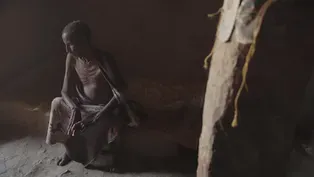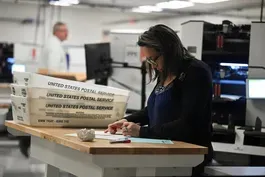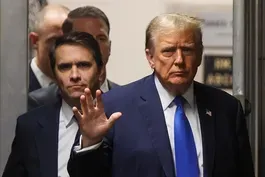
Melinda French Gates on economic empowerment for women
Clip: 4/18/2024 | 8m 15sVideo has Closed Captions
Melinda French Gates discusses increasing economic empowerment for women
The United Nations estimates that closing the gender pay gap and giving women more access to loans and capital could give the global economy a $7 trillion bump. These issues are top of mind as leaders gather in Washington for meetings hosted by the World Bank and International Monetary Fund. William Brangham spoke with Melinda French Gates about increasing economic empowerment for women.
Problems with Closed Captions? Closed Captioning Feedback
Problems with Closed Captions? Closed Captioning Feedback
Major corporate funding for the PBS News Hour is provided by BDO, BNSF, Consumer Cellular, American Cruise Lines, and Raymond James. Funding for the PBS NewsHour Weekend is provided by...

Melinda French Gates on economic empowerment for women
Clip: 4/18/2024 | 8m 15sVideo has Closed Captions
The United Nations estimates that closing the gender pay gap and giving women more access to loans and capital could give the global economy a $7 trillion bump. These issues are top of mind as leaders gather in Washington for meetings hosted by the World Bank and International Monetary Fund. William Brangham spoke with Melinda French Gates about increasing economic empowerment for women.
Problems with Closed Captions? Closed Captioning Feedback
How to Watch PBS News Hour
PBS News Hour is available to stream on pbs.org and the free PBS App, available on iPhone, Apple TV, Android TV, Android smartphones, Amazon Fire TV, Amazon Fire Tablet, Roku, Samsung Smart TV, and Vizio.
Providing Support for PBS.org
Learn Moreabout PBS online sponsorshipWILLIAM BRANGHAM: Consider# this.
In at least 93 countries, it's legally acceptable to pay women less for doing the exact same job as a man.
That's just one of a litany of# examples where women's economic equality is denied.
And these inequities# impact not just women, but their children,## their families and their broader communities.# The U.N. estimates that closing the gender gap,## not just in pay, but in other ways, such as# giving them more access to loans and capital,## could give the global economy# a $7 trillion jump-start.
These issues are atop of mind for many this# week as world leaders gather in Washington,## D.C., for meetings hosted by the World# Bank and the International Monetary Fund.
One person advocating for a more just economy# is Melinda French Gates.
She's the co-chair of## the Bill and Melinda Gates Foundation,# which is a funder of the "NewsHour."
Melinda Gates, welcome back to the# "NewsHour."
So nice to have you here.
MELINDA FRENCH GATES, Co-Founder, Bill and Melinda# Gates Foundation: Thanks for having me, William.
WILLIAM BRANGHAM: So I mentioned this# one fact about the -.. to pay women less than men, but, again,# that's just one example of so many.
When you are here trying to convince# people about this inequity existing## and causing harms, what do you argue?
MELINDA FRENCH GATES: I'm arguing for,## let's fix the system.
And to# be honest, it's not that hard.
If you look at high-income countries,# we don't have it all right yet,## but women are doing better in# our country than in many others.
WILLIAM BRANGHAM: Right.
We're not immune to this.
MELINDA FRENCH GATES: We're not immune.. it was 19 -- early 1970s that a woman finally## didn't need her husband to sign on# her bank account in our country.
So if we get the regulations right in# other countries and we move capital,## this large-scale capital that goes from# the World Bank or the IMF, but we really## hook it up to the women entrepreneurs,# there are literally millions of female## entrepreneurs across the continent of Africa,# and we make sure the loans are right-sized,## the interest rate is paid monthly, not# weekly, it isn't at an exorbitant fee,## these women will actually grow not just# their business, but their entire economy.
WILLIAM BRANGHAM: And those disparities that# you're describing, those are what exist today?
MELINDA FRENCH GATES: Yes, they still exist# in many countries.
A woman can't get a loan## without her husband signing off on it.
So we need# to fix those laws, but we also need to fix credit.
Right now, a woman often doesn't have a credit# score in Africa.
She doesn't have the collateral## to prove she's creditworthy.
And yet, if# we can get her on a mobile bank account,## which many women are getting on to, we can# start to see that she's paying bills.
She's## actually financially very literate and that she# can build credit and we can help her then get a## small loan to not only educate her kids,# but advance the business she cares about.
WILLIAM BRANGHAM: So you're here# talking to the World Bank and the## IMF and the heads of these very large# international banking structures.
When you make this argument to them, are# they nodding along with you?
Are they## looking skeptical at you?
Do they# appreciate what you're talking about?
MELINDA FRENCH GATES: I would say it's only# been in about the last eight years that the## world and these large financial institutions have# woken up to the opportunity that women present.
If I look back 15 years, when I used to# come to these institutions or to the U.N.,## we didn't really talk about women.# But now people realize -- like,## take the United States.
Women have the most# purchasing power of anybody in our own country.
WILLIAM BRANGHAM: Right.
MELINDA FRENCH G..
But they have to get their whole# organization moving in that direction.
WILLIAM BRANGHAM: How do you explain that chasm,# the disparity that exists?
Again, we understand## some of the societal forces that work here that# we have been fighting against for generations.
How do you explain that around the world?
MELINDA FRENCH GATES: Well, it's# much the same.
It's the social norms.
For better or for worse, we set the world up for# males.
And what's happening now is that females,## when you send them out into the work force# or to capitalize their small business,## they run up against these systemic barriers.# So, a man doesn't understand their business## if he's the one that's going to extend the# credit or he's going to give the loan, right?
They don't see the business.
They don't# understand it.
They often have bias,## thinking, oh, a woman can't run a business.# So we have to break down those barriers so## that we show and we demonstrate that women can# create society the way we want it and that we## can as investors get a good return.
And then I# think you will see vast amounts of money flow.
WILLIAM BRANGHAM: It's a good investment,## a good return on investment that always.. MELINDA FRENCH GATES: That's# right.
And it should be,## right?
We expect in our investments to have a# return, but sometimes also in .. For instance, these large global institutions# we're talking about, you have to both do some## grant funding and the loan piece, because we# know -- India is a perfect example.
They put## their women -- many women in these self-help# groups, and now they are lending to 42## million women-led businesses because they're# seeing it's advancing the Indian economy.
But there had to be grant-making at the# beginning to get women organized and have## the mentorship and the sponsorship to then# be able to know how to start their business.
WILLIAM BRANGHAM: I imagine there's also this# suite of other complicating factors too, war,## conflict, political unrest,# climate change, that, again,## we know disproportionately falls hardest on# women and that you also have to be trying to## ameliorate those things to create the# conditions by which women can thrive.
MELINDA FRENCH GATES: Absolutely.
And it's particularly difficult at the meetings#.. climate change.
Conflict is rife.
But what# we're trying to get the high-income countries## to understand is, you have to also continue these# investments in Africa and across the continent## of Africa and Southeast Asia, because countries# want to move from low to middle to high income.
And we know it's possible.
Peru has done# it.
India has done it.
South Korea used## to be a recipient of aid.
Now they give aid.# And so, if we keep making these investments,## you will see peace and prosperity in# those places, as opposed to more conflict.
WILLIAM BRANGHAM: You touched on this before,## but I know you're here trying to cajole bankers# and the World Bank and t..
Some of this, as you mentioned,# is also pushing back on societal,## cultural, oftentimes religious beliefs about# the role that women should and ought to play## in societies.
That seems like that's# a much tougher stream to swim against.
MELINDA FRENCH GATES: Those issues are tough to# swim against, even in our own country, right?
We're seeing the rollback of women's rights and# health.
And so, when I look at those issues,## I say we need to get more women,# for instance, in our country,## in the 7,000 seats in the statehouses# and in Congress and in the Senate,## because women have a different lens on# society and they will make different policy.
In countries around the world, much is# the same thing.
Some -- they're trying## to get more women into their parliaments# because they create different policies.## They see what is often unseen.
They see# the unpaid work women do.
They see the## caregiving burden of they need to care# for the children and run the business.
And so I think getting women into all those# seats of power really will change society.
WILLIAM BRANGHAM: Are there examples that you# point to, if someone expresses skepticism about## moving this rock up this huge hill, that# you say, look at X, this proof of concept?
MELINDA FRENCH GATES: Well, at large scale,# I say, look at India.
India really has gotten## their mobile phone penetration out there.# They have gotten people I.D.ed on their## phone.
People have bank accounts.
It's# not just men, but they have looked at## the gender gap and they're trying to get# more women with their own bank account.
They're now scaling and getting resources# out to women.
And they're starting to see## they're on the economic rise in a huge# way.
So I point to them as a large-scale## example of how and where this can work.
WILLIAM BRANGHAM: Melinda French Gates, thank# you so much for being here.
Great to see you.
MELINDA FRENCH GATES: Thanks for having me.
Ethiopia conflict eases, but starvation risk remains
Video has Closed Captions
Conflict in Ethiopia eases, but millions there still face risk of starvation (6m 25s)
More companies explore 4-day workweek for employees
Video has Closed Captions
The benefits companies are seeing after embracing 4-day workweek (7m 59s)
Record ocean heat triggers massive coral reef bleaching
Video has Closed Captions
Record-breaking ocean heat triggers massive coral reef bleaching (6m)
Report reveals high turnover within local election offices
Video has Closed Captions
New report reveals high turnover within local election offices (6m 30s)
Trump trial closer to opening after 12 jurors selected
Video has Closed Captions
Trump hush money trial closer to opening statements after 12 jurors selected (4m 38s)
U.S. hits Iran with sanctions, urges Israel against attack
Video has Closed Captions
U.S. hits Iran with new sanctions while urging Israel against military response (7m 6s)
Providing Support for PBS.org
Learn Moreabout PBS online sponsorshipSupport for PBS provided by:
Major corporate funding for the PBS News Hour is provided by BDO, BNSF, Consumer Cellular, American Cruise Lines, and Raymond James. Funding for the PBS NewsHour Weekend is provided by...

















